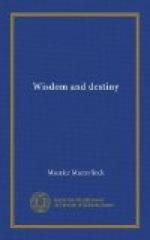21. We do not imply that Louis XVI. should necessarily have been a man of this stamp, a man of genius; although to have genius seems almost the duty of him who sways in his hands the destiny of vast numbers of men. Nor do we claim that the best men among us to-day would have been able to escape his errors, or the misfortunes to which they gave rise. And yet there is one thing certain: that of all these misfortunes none had super-human origin; not one was supernaturally, or too mysteriously, inevitable. They came not from another world; they were launched by no monstrous god, capricious and incomprehensible. They were born of an idea of justice that men failed to grasp; an idea of justice that suddenly had wakened in life, but never had lain asleep in the reason of man. And is there a thing in this world can be more reassuring, or nearer to us, more profoundly human, than an idea of justice? Louis XVI. may well have regretted that this idea, that shattered his peace, should have awakened during his reign; but this was the only reproach he could level at fate; and when we murmur at fate ourselves our complaints have much the same value. For the rest, it is legitimate enough to suppose that there needed but one single act of energy, absolute loyalty, disinterested, clear-sighted wisdom, to change the whole course of events. If the flight to Varennes—in itself an act of duplicity and culpable weakness—had only been arranged a little less childishly, foolishly (as any man would have arranged it who was accustomed to the habits of life), there can be not a doubt that Louis XVI. would never have died on the scaffold. Was it a god, or his blind reliance on Marie Antoinette, that led him to entrust de Fersen—a stupid, conceited, and tactless creature—with the preparations and control of this disastrous journey? Was it a force instinct with great mystery, or only his own unconsciousness, heedlessness, thoughtlessness, and a kind of strange apathetic submission—such as the weak and the idle will often display at moments of danger, when they seem almost to challenge their star— that induced him again and again, at each change of horses, to put his head out of the carriage window, and thus be recognised three or four times? And at the moment that decided all, in that throbbing and sinister night of Varennes—a night indeed when fatality should have been an immovable mountain governing all the horizon—do we not see this fatality stumbling at every step, like a child that is learning to walk and wonders, is it




